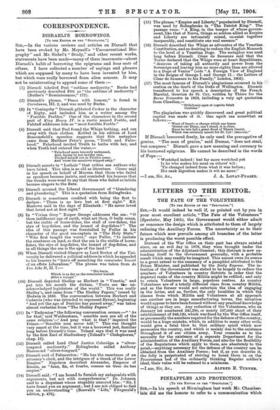THE PATE OF THE VOLUNTEERS.
SIR,—It would indeed be well if, as pointed out by you in your most excellent article, "The Fate of the Volunteers" (Spectator, May 14th), the Government would either admit or renounce the design which is attributed to them of largely reducing the Auxiliary Forces. The uncertainty as to their future which now prevails among all branches of the latter
is producing the worst possible effect.
Distrust of the War Office on their part has always existed since, on an evil day in 1878, they were brought under the administration of the Adjutant-General; this distrust is now ex- tending itself to the Government generally, with a probable result which may readily be imagined. This unrest owes its source to a great extent to the summary of a pamphlet attributed to the Prime Minister, and published by the Daily Express. The in- tention of the Government was stated to be largely to reduce the numbers of Volunteers in country districts in order that the depleted ranks of the country Militia might be refilled; and only to retain Volunteers in large, populous centres. As country Volunteers are of a totally different class from country Militia, and as the former would not entertain the idea of engaging in the latter, and as, further, the only localities in which the classes from which Militia and Volunteers at all approach one another are in large manufacturing towns, the intention would appear to have been formed without any practical knowledge of things as they are. Any reduction of the Volunteers, who On January 1st numbered 241,280, or nearly 107,000 short of their establishment of 348,120, which was fixed by the War Office itself, as presumedly the numbers required for the defence of the country, would be a huge mistake, which, in addition to many other evils, would give a fatal blow to that military spirit which now permeates the country, and which is mainly due to the existence throughout it of our citizen army. Your remarks as to the necessity for the existence of a separate Department for the administration of the Auxiliary Forces, and also for the flexibility of the Regulations which apply to them, are absolutely to the point,—anything necessary or the defence of the country can be obtained from the Auxiliary Forces ; but if, as you describe it, the folly is perpetrated of striving to break them in on the Procrustean bed of the ordinarily thinking Regular soldier's ideal, their value will be reduced to a minimum.
—lam, Sir, &c., ALFRED E. TURNER.


































 Previous page
Previous page